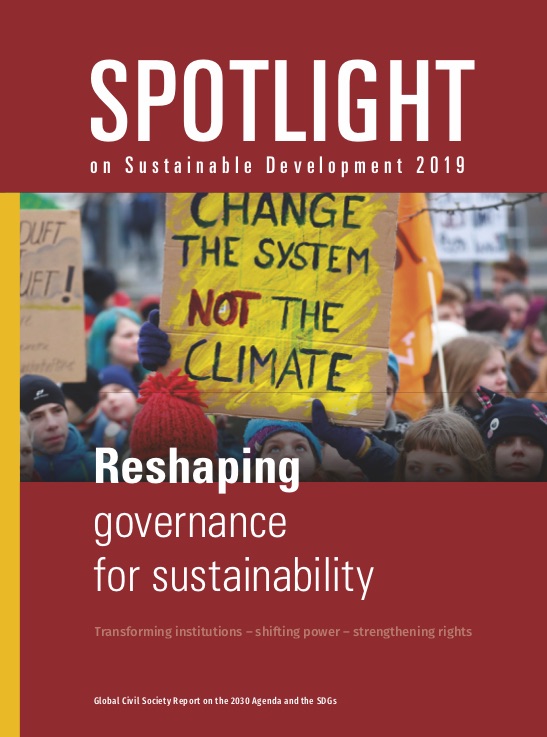Global Civil Society Report on the 2030 Agenda and the SDGs
 Four years after the adoption of the 2030 Agenda the world is off-track to achieve the Sustainable Development Goals (SDGs). Most governments have failed to turn the transformational vision of the 2030 Agenda into real transformational policies. Even worse, xenophobia and authoritarianism are on the rise in a growing number of countries.
Four years after the adoption of the 2030 Agenda the world is off-track to achieve the Sustainable Development Goals (SDGs). Most governments have failed to turn the transformational vision of the 2030 Agenda into real transformational policies. Even worse, xenophobia and authoritarianism are on the rise in a growing number of countries.
But there are signs of change. Social movements have emerged worldwide, many with young people and women in the lead. They not only challenge bad or inefficient government policies, but also share a fundamental critique of underlying social structures, power relations and governance arrangements.
Thus, the implementation of the 2030 Agenda is not just a matter of better policies. Meaningfully tackling the obstacles and contradictions in the implementation of the 2030 Agenda and the SDGs requires more holistic and more sweeping shifts in how and where power is vested, including through institutional, legal, social, economic and political commitments to realizing human rights.
In other words, a simple software update is not enough – we have to revisit and reshape the hardware of sustainable development.
Civil society organizations have a key role to play as independent watchdogs holding governments and international organizations accountable for their (positive or negative) contributions to the implementation of the 2030 Agenda.
Since 2016, the Civil Society Reflection Group on the 2030 Agenda for Sustainable Development has published the annual Spotlight Report, assessing the implementation of the 2030 Agenda and the structural obstacles to its realization.
The Spotlight Report 2019 report dives more deeply into the (global) governance arrangements and institutions that will be necessary to implement alternative policies and to unleash the transformative potential of the SDGs. It offers analysis and recommendations on how to strengthen inclusive and participatory governance and to overcome obstacles and gaps in the implementation of the 2030 Agenda and the SDGs. In doing this, it poses a strong call to action to world leaders just in advance of the SDG Summit in September 2019.
The Spotlight Report is supported by a broad range of global civil society organizations and trade unions. It is also informed by the experiences and reports of national and regional groups and coalitions from many parts of the world. The contributions reflect the rich geographic and cultural diversity of their authors. But what all contributions have in common is the belief that change must start at the local and national level. It requires strengthening bottom-up governance and governance coherence, and providing those institutions which are responsible for the implementation of the 2030 Agenda and the SDGs with adequate financial resources and effective political and legal instruments.
